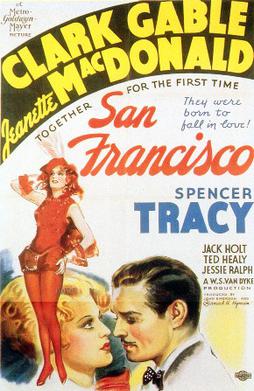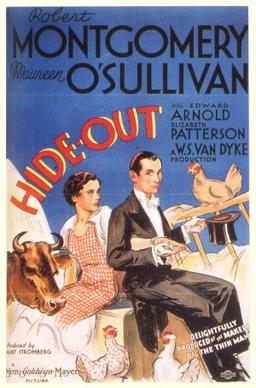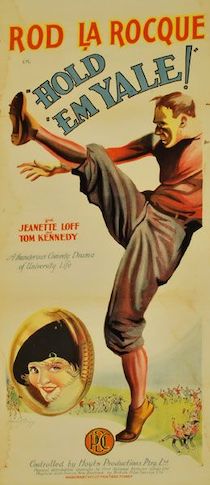
San Francisco is a 1936 American musical-drama disaster film directed by W. S. Van Dyke, based on the April 18, 1906 San Francisco earthquake. The film stars Clark Gable, Jeanette MacDonald and Spencer Tracy. MacDonald's singing helped make this film a major hit, coming on the heels of her other 1936 blockbuster, Rose Marie.
The year 1937 in film involved some significant events, including the Walt Disney production of the first American full-length animated film, Snow White and the Seven Dwarfs.

Hide-Out is a 1934 American pre-Code comedy, crime, drama, romance film directed by W. S. Van Dyke and starring Robert Montgomery and Maureen O'Sullivan. It also features a young Mickey Rooney. The film was nominated for an Academy Award for Best Writing - Original Story. It was re-made in 1941 as I'll Wait for You.

Jeanette Loff was an American actress, musician, and singer who came to prominence for her appearances in several Pathé Exchange and Universal Pictures films in the 1920s.

The Racketeer is a 1929 American Pre-Code drama film. Directed by Howard Higgin, the film is also known as Love's Conquest in the United Kingdom. It tells the tale of some members of the criminal class in 1920s America, and in particular one man and one woman's attempts to help him. Gossip columnist Hedda Hopper appears in a minor role. The film is one of the early talkies, and as a result, dialogue is very sparse.

Men of Boys Town is a 1941 American drama film directed by Norman Taurog and written by James Kevin McGuinness. It is a sequel to the 1938 film Boys Town. The film stars Spencer Tracy, Mickey Rooney, Bobs Watson, Larry Nunn, Darryl Hickman and Henry O'Neill. The film was released on April 11, 1941, by Metro-Goldwyn-Mayer.

Uncle Tom's Cabin is a 1927 American synchronized sound drama film directed by Harry A. Pollard and released by Universal Pictures. While the film has no audible dialog, it was released with a synchronized musical score with sound effects using the Western Electric sound-on-film process. The film is based on the 1852 novel Uncle Tom's Cabin by Harriet Beecher Stowe and was the last silent version filmed.
The Case Against Mrs. Ames is a 1936 American mystery drama film written by C. Graham Baker and Gene Towne based on a serial of the same name by Arthur Somers Roche originally published in Collier's Weekly magazine in 1934, and then as a novel in 1936. The film was directed by William A. Seiter and stars Madeleine Carroll and George Brent, and features Arthur Treacher, Alan Baxter, Beulah Bondi and Alan Mowbray. Paramount had originally intended to cast Gary Cooper and Carole Lombard in the lead roles.

Annapolis is a 1928 synchronized sound film drama directed by Christy Cabanne. While the film has no audible dialog, it was released with a synchronized musical score with sound effects using both the sound-on-disc and sound-on-film process. It was recorded using the Photophone sound system. It stars Johnny Mack Brown, Jeanette Loff and Hugh Allan.

Pleasure Cruise is a 1933 American Pre-Code comedy film directed by Frank Tuttle and written by Guy Bolton. The film stars Genevieve Tobin, Roland Young, Ralph Forbes, Una O'Connor, Herbert Mundin and Minna Gombell. The film was released on March 24, 1933, by Fox Film Corporation.
Norman Spencer Matthews, was an American musician and songwriter. He is best known for having served as musical director/composer for Warner Brothers' /Leon Schlesinger's Looney Tunes and Merrie Melodies cartoon shorts from 1933 to 1936.

Tillie the Toiler is a 1941 American comedy film directed by Sidney Salkow and starring Kay Harris, William Tracy, and George Watts. The screenplay was written by Karen DeWolf and Francis Martin, from DeWolf's story, which in turn was based on the comic strip of the same name by Russ Westover. It was the second film based on the comic strip, and the first sound picture, the other being the 1927 silent film also titled Tillie the Toiler.

Party Girl is a 1930 American pre-Code crime film directed by Victor Halperin and starring Douglas Fairbanks Jr., Jeanette Loff, and Marie Prevost. It is also known by the alternative title of Dangerous Business, the title of the novel on which it is based. It follows a New York businessman who inadvertently becomes involved in the criminal activities of a covert escort agency.

St. Louis Woman is a 1934 American pre-Code musical drama film directed by Albert Ray and starring Jeanette Loff, Johnny Mack Brown and Earle Foxe. It is also known by the alternative title of Missouri Nightingale.
The Black Ace is a 1928 American silent Western film directed by Leo D. Maloney and starring Don Coleman, Jeanette Loff and J.P. McGowan.

Hold 'Em Yale, alternately known as At Yale, is a 1928 American silent comedy film directed by Edward H. Griffith and starring Rod La Rocque, Jeanette Loff, and Hugh Allan. It was adapted from the Owen Davis play of the same name, and executive-produced by Cecil B. DeMille. The film was preserved by the Academy Film Archive in 2013.

Million Dollar Baby is a 1934 American comedy film directed by Joseph Santley and starring Arline Judge, Ray Walker and Jimmy Fay.

.45 Calibre War is a 1929 American silent Western film directed by Leo D. Maloney and starring Don Coleman, Ben Corbett and Jeanette Loff.

The Fourth Musketeer is a 1923 American silent drama film directed by William K. Howard and starring Johnnie Walker, Eileen Percy and Eddie Gribbon.

The Sophomore is a 1929 American sound all-talking pre-Code comedy film directed by Leo McCarey and starring Eddie Quillan, Sally O'Neil and Jeanette Loff. Made during the early sound era, it was shot using the RCA Photophone sound system. The film survives in an mute print of the alternate sound version known as an International Sound Version which was meant to be played along with Vitaphone discs. It is not known whether the Vitaphone type soundtrack discs to the International Sound Version are extant.
















